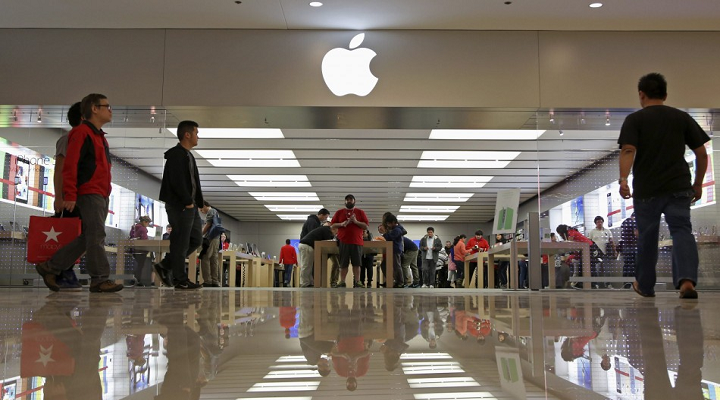Apple's Influence On Google's Market Dominance

Table of Contents
The iOS Ecosystem and Google's Mobile Strategy
Google's mobile strategy has been significantly shaped by Apple's closed iOS ecosystem. This influence is multifaceted and profoundly impacts Google's search engine, advertising revenue, and overall market share.
The iPhone's Impact on Mobile Search
Apple's control over iOS and the App Store presented a unique challenge for Google. To remain relevant, Google had to meticulously optimize its search engine and services for this closed ecosystem. This resulted in:
- A significant financial reliance on Apple: Google pays Apple billions annually to remain the default search engine on iPhones. This deal highlights Apple's leverage and the strategic importance of iOS for Google's search dominance.
- Adaptation to Apple's privacy features: Apple's increasing focus on user privacy, including features like App Tracking Transparency (ATT), directly impacts Google's data collection capabilities, crucial for its targeted advertising business. Google has had to adapt its advertising strategies to work within these constraints.
- Optimization for a curated app experience: Google needed to ensure its apps functioned seamlessly within the tightly controlled iOS environment, requiring specific design and development considerations.
Here are some concrete examples of Google adapting to the iOS environment:
- Developing iOS-specific features for Google Maps and other apps.
- Investing heavily in optimizing its search algorithm for iOS devices.
- Implementing privacy-preserving advertising techniques to comply with Apple's policies.
Competition in Mobile Operating Systems
The ongoing battle between Android and iOS directly affects Google's market share. While Android dominates globally in terms of raw numbers, Apple's iOS boasts significantly higher average revenue per user (ARPU) and a fiercely loyal user base.
- User Experience: Apple's focus on user experience and intuitive design has consistently presented a challenge for Android, forcing Google to continuously improve its operating system and user interface.
- App Ecosystem: The quality and selection of apps available on the App Store are often perceived as superior to the Google Play Store, influencing user preference and potentially impacting Android app development.
- Market Share Dynamics: While Android holds a larger market share globally, iOS commands a disproportionately high share of revenue, underscoring Apple's influence on the mobile market.
Here’s a comparison of key features impacting user choice:
| Feature | Android | iOS |
|---|---|---|
| Customization | Highly customizable | Less customizable |
| App Ecosystem | Larger app selection, but varied quality | Smaller, curated app selection |
| Price Point | Wide range of device prices | Generally higher price point |
| User Experience | Improving, but often fragmented | Consistently praised for ease of use |
Apple's Innovation as a Catalyst for Google
Apple’s relentless pursuit of innovation has acted as a significant catalyst for Google, pushing the search giant to constantly improve its own offerings.
Pushing the Boundaries of Hardware and Software Integration
Apple's success stems from a seamless integration of hardware and software. This has spurred Google to enhance its own hardware and software synergy, particularly in the realm of mobile devices:
- Hardware Competition: Apple's successful iPhones and iPads have pushed Google to invest more heavily in its Pixel devices, although it faces an uphill battle to match Apple’s brand recognition and market penetration.
- Software Integration: Apple Pay's success forced Google to develop and improve its Google Pay service, and features like iMessage have driven Google to invest in its own messaging and communication platforms.
- AI and Machine Learning: Apple's advancements in AI and machine learning, evident in features like Siri, have pushed Google to accelerate its research and development in this critical field, improving Google Assistant and other AI-powered services.
Here are some specific examples of features and innovations:
- Apple: Siri, Apple Pay, iMessage, ARKit
- Google: Google Assistant, Google Pay, Allo (discontinued), ARCore
Shaping the Future of Search and AI
The competition between Apple and Google in the AI space is particularly fierce, with significant implications for the future of search technology:
- AI-powered Search: Both companies are investing heavily in AI-powered search algorithms, aiming to deliver more relevant and personalized results.
- Voice Search: The rise of voice assistants like Siri and Google Assistant is fundamentally changing how users interact with search engines.
- Long-term Implications: The ongoing competition in AI will likely shape the future of information retrieval, with implications extending beyond search to encompass various aspects of our digital lives.
Here are some key AI advancements from both companies:
- Apple: On-device processing for Siri, advanced natural language processing
- Google: Large language models, deep learning algorithms used in Google Search and Assistant
The Advertising Landscape and Apple's Privacy Focus
Apple's increasing emphasis on user privacy has had a significant impact on Google's advertising revenue and data collection practices.
Impact of Apple's Privacy Changes on Google's Advertising Revenue
Apple's privacy-focused iOS updates, particularly App Tracking Transparency (ATT), have dramatically altered the landscape of targeted advertising:
- Reduced Targeting Capabilities: ATT significantly limits Google's ability to track users across apps and websites, impacting the effectiveness of its targeted advertising.
- Adaptation Strategies: Google has had to adapt its advertising strategies, focusing more on contextual advertising and other privacy-preserving methods.
- Financial Implications: Apple's changes have resulted in a reduction in Google's advertising revenue, forcing them to seek alternative monetization strategies.
Here are some of the effects of Apple's privacy features on Google's ad revenue and user targeting:
- Decreased effectiveness of retargeting ads.
- Increased reliance on contextual advertising.
- Shift towards privacy-preserving advertising technologies.
The Shifting Balance of Power in Data Collection
Apple's commitment to user privacy has shifted the balance of power in data collection, placing increasing constraints on companies like Google:
- Data Collection Restrictions: Apple's policies limit the amount and type of data companies can collect from iOS users.
- Impact on Personalization: This directly impacts Google's ability to personalize user experiences and deliver highly targeted ads.
- Future Scenarios: Continued advancements in user privacy will likely lead to a more privacy-centric digital world, potentially reshaping the entire advertising industry.
Here’s a comparison of Apple and Google’s data collection practices:
| Feature | Apple | |
|---|---|---|
| Data Collection | More restrictive, focused on user privacy | More extensive, used for personalization and advertising |
| User Transparency | High emphasis on user control over data | Less emphasis on user control |
| Privacy Policies | More transparent and user-friendly | Complex and often criticized |
Conclusion
Apple's influence on Google's market dominance is profound and multifaceted. From driving innovation in mobile operating systems and AI to challenging Google's advertising model through privacy-focused features, Apple has consistently pushed Google to adapt and improve. This competitive dynamic has ultimately benefited consumers through increased innovation and a greater emphasis on user privacy. Understanding Apple's influence on Google is crucial for anyone interested in the future of technology. Continue exploring the complex relationship between these tech giants by researching "Apple's Influence on Google" further, and stay informed about the evolving competitive landscape.

Featured Posts
-
 Cineplex Q1 Results Attendance Drop Leads To Financial Loss
May 11, 2025
Cineplex Q1 Results Attendance Drop Leads To Financial Loss
May 11, 2025 -
 The Speedway Classic Mlb Commissioner Rob Manfreds Perspective
May 11, 2025
The Speedway Classic Mlb Commissioner Rob Manfreds Perspective
May 11, 2025 -
 Jessica Simpson Dementerar Rykten Om Ormsperma
May 11, 2025
Jessica Simpson Dementerar Rykten Om Ormsperma
May 11, 2025 -
 Analyzing Jamaicas Grand Slam Delight A Jamaica Observer Perspective
May 11, 2025
Analyzing Jamaicas Grand Slam Delight A Jamaica Observer Perspective
May 11, 2025 -
 Lily Collins Stars In A New Calvin Klein Campaign See The Photos
May 11, 2025
Lily Collins Stars In A New Calvin Klein Campaign See The Photos
May 11, 2025
